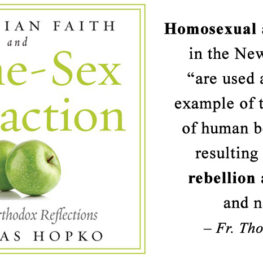American Thinker | Jamie Glazov | Jun 29, 2008
American Thinker’s guest today is David Klinghoffer, a senior fellow in the Discovery Institute’s program in Religion, Liberty, and Public Life and a former senior editor of National Review. He is the author of The Lord Will Gather Me In, Why the Jews Rejected Jesus, and Shattered Tablets. His new book is, How Would God Vote?: Why the Bible Commands You to Be a Conservative.
[…]
Glazov: What inspired you to write this book?
Klinghoffer: I was dismayed at the way conservatives have let ourselves be bullied by secular liberals into giving up any effort either to draw wisdom from the Bible in shaping our policy goals, or to speak the language of faith in political contests.
In applying Biblical wisdom to the top 20 hot-button issues of our day, my purpose is to give the folks on our side the tools to recover religion as an essential guide to policymaking. We’re so terrified that someone might call us a theocrat. I’ve got news for conservatives: They’ll call us that no matter what we do. If we don’t talk about faith, they’ll just say we’re crypto-theocrats. Meanwhile, Republicans have got a presumptive nominee in John McCain who refuses to acknowledge the need many voters have to be spiritually inspired, a need that Barack Obama seems poised to ride quite handily to the White House.
Glazov: Why do you think secular liberals go into a fit of moral indignation if there is even a hint that the Bible is involved in something, but if the Koran enters the picture, they start bending over backwards to appease Muslim forces. If secular liberals are so serious about the separation of Church and State, where is their passion on the despotism of Sharia?
Klinghoffer: Neither secular indignation at the Bible, nor this fawning reverence for Islam, should surprise a student of the Bible. Scripture’s laws and narratives describe patterns in human behavior that are timeless. The evidence of this is as observable today as it was three thousand years ago. Again and again, Moses and the later Hebrew prophets warned against the temptation to look to false alien spiritual traditions for inspiration and truth. It is, in a word, the temptation to idolatry. While the Israelites were still on their 40-year sojourn in the desert, Moses foresaw that when they entered the promised land, they would stumble and ask each about the aboriginal Canaanites, “How did these nations worship their gods, and even I will do the same” (Deuteronomy 12:30).
A culture like ours that was until recently guided by Scriptural wisdom will, by its nature, constantly have to face down demands from within that we turn to alien sources of moral authority. Whether those sources are secular or Islamic, it’s the same dynamic at work. The irony is that some of the concessions we’ve seen in the West to Sharia law are not negative, in themselves, at all. Like Harvard’s move to block out certain periods at the gym when women, of any religion or none, can exercise without being ogled at by men. That’s something that should have been done because our own Western religious tradition values modesty. It’s a shame that the reform was instituted only when Muslims demanded it.
[…]
Glazov: If our society deems religion a private matter, why bring the Bible into politics at all?
Klinghoffer: Jews and Christians alike tend to undersell or dumb down our faiths. We’re content to think the Bible is just a book of stories, ethical rules for personal observance, or abstract theological dogma. On its own terms, however, Scripture is much more than that. Something I found incredibly exciting about Judaism, my own inherited religion, when I was getting to know it as an adult, is that it addresses every conceivable kind of question a person or a society could have. Based on Proverbs 8:30, Biblical tradition depicts Scripture as nothing less than a blueprint of moral reality. I can’t think of any reason a wise person would not want to know what the Bible can teach us about immigration, climate change, war, Islamic terror, or any of the other issues I cover.
Glazov: Does a Biblical worldview match up exactly with a conservative political outlook, and if not, why?
Klinghoffer: Notice that the book isn’t subtitled “Why God Commands You to Be a Republican.” Even “conservative” may not be exactly the right word. There are points where Biblical wisdom parts ways with standard right-wing Republican orthodoxy. On immigration, I show from a reading of the Book of Ruth and other texts the nuanced approach, being both demanding of and welcoming toward immigrants, that Scripture would have us adopt. Based on the spiritual significance that the Bible attaches to race and nation – the 3 primordial races and the 70 primordial nations – I don’t think the mantra of “color-blindness” and “letting race go” can be fully sustained.
. . . more



